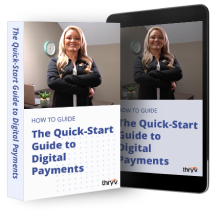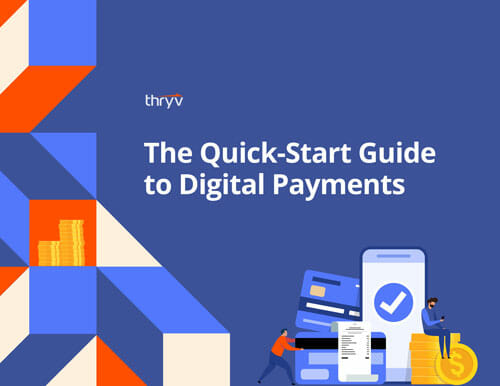Being a responsible business owner involves looking out for your customers as much as you look at yourself. With financial crime rising, you can’t afford to slack off on payment security.
In fact, 80% more businesses filed suspicious activity reports in 2021 compared to 2020.

Free: Quickstart Guide to Digital Payments
How to accept payment depends on your business and its customers. This guide will help you choose the method that suits your business.
Save NowIf you proactively add safer payment options and more security, you can help keep payment fraud from ruining your business.
Credit Card Fraud
More than three-quarters (77.3%) of consumers feel safer paying online than in person, according to Thryv’s recent payment survey. This could be, in part, due to the rise of credit card skimmers.
Credit card skimming is a sneaky tactic using a device bolted onto card readers to collect card numbers. Identity thieves use those numbers to create duplicate cards and make purchases.
About 35.4% of all credit card fraud in the U.S. is related to these counterfeit cards.
Not only do these fraudulent actions affect your customers’ pockets, but yours could take a hit as well.
As a business, you lose the sale revenue, the cost of products used during the service and the payment processor chargeback fee.
Cashier’s Check Fraud
If you’re a business that accepts checks, cashier’s checks are likely your favorite paper payment.
While a cashier’s check is similar to a personal check, the difference is a cashier’s check is written by the bank. It guarantees the money is available. That is, unless it’s a fake.
Scammers send fake cashier’s checks with false information. Those checks can clear with no problem. It can take weeks for a cashier’s check to be verified; by then, you’ve already provided a service.
Once that check bounces, the funds are taken out of your account.
Small Business Financial Fraud
You would never try to do wrong, but not everyone in the world is so well-meaning. Sometimes bad seeds slip through the cracks. Less-than-honorable employees can find ways to steal from your business.
Embezzlement and misappropriation of funds are some of the most common tactics.
Where there is small business financial fraud, usually there are clear signs.
- Trusted employees are secretive about inventory and expenses.
- Inventory is missing or written off as a loss too often.
- Charges to company accounts don’t add up.
- Employees suddenly become financially flush without explanation.
What are Safe Payment Options?
Customers can pay in various ways, but as we mentioned earlier, most people feel safer paying online than in person. Credit cards offer convenient ways to pay; they offer fraud security features and can reverse charges relatively easily.
A payment processor like ThryvPay is another extremely safe online option. It uses the same data encryption monitoring technology as credit cards. Digital wallets like Apple Pay, Google Pay work this way, too.
ThryvPay also provides a dedicated team of service experts to assist with disputes, chargebacks and other payment concerns.
As long as you’re payment-card-industry (PCI) compliant, your business is safe. If a data breach does occur and you’re not PCI compliant, your business will face penalties and fines ranging from $5,000 to $500,000.
How to Avoid Payment Fraud
Don’t get caught by scammers looking to make bank off you and your customers. There are several fail-safes you can put in place to potentially avoid payment fraud.
- Request additional suspicious activity monitoring and alerts from your bank.
- Question even the smallest unfamiliar charges to your account to discourage internal theft.
- Train employees on spotting payment fraud and set up a dual approval process.
- Avoid paper checks and ensure your business’s online payment processor is secure.
- Always use strong cybersecurity practices.
In addition to safe payment options, accepting Europay, Mastercard and Visa (EMV) chips on cards also can protect you. If you don’t accept EMV chips, then your business is responsible for any stolen funds from unauthorized credit card use.
Chipped cards are more secure than magnetic-stripe cards because a one-of-a-kind code is created for each transaction. Because of this, in 2015, the responsibility for fraudulent credit card transactions was transferred to businesses not set up to accept EMV chip cards.

The Quickstart Guide
to Digital Payments
Find everything you need to know about collecting payments, processing payments, late payments, and more in this free resource.





